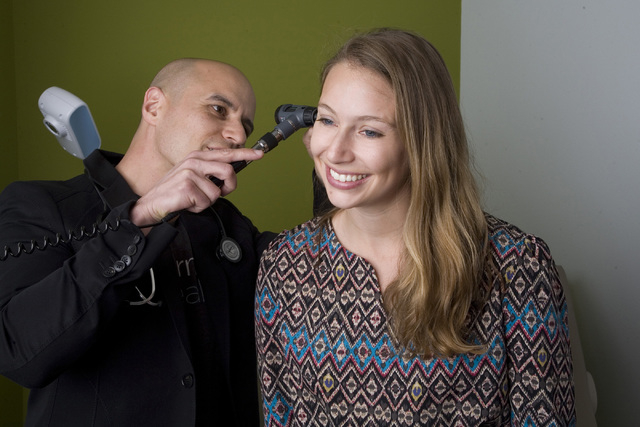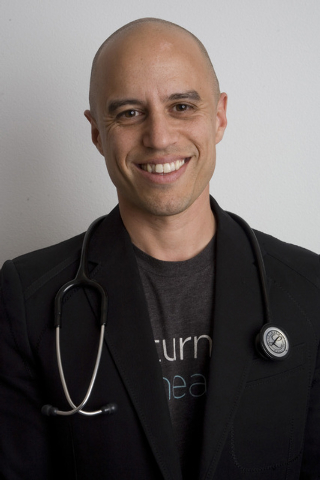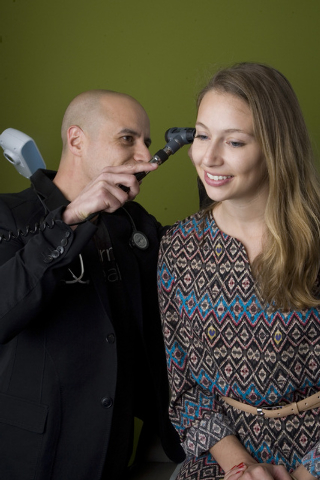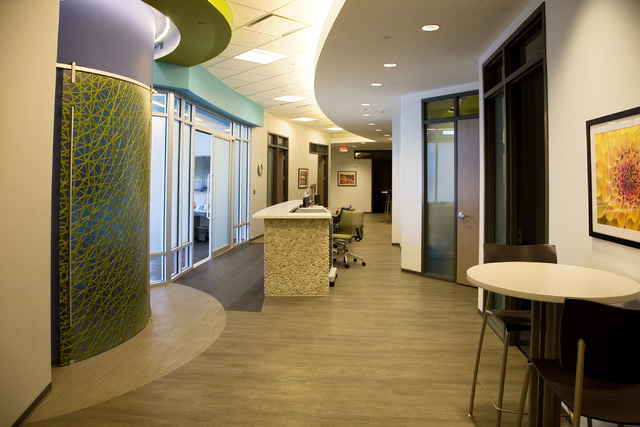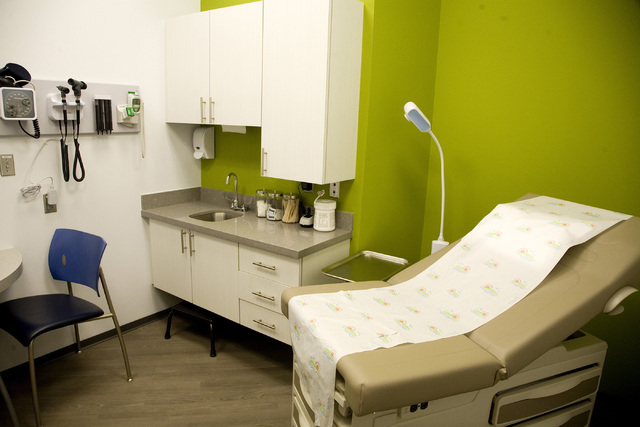NEVADAN AT WORK: Internal medicine doc also focuses on healing medical field
Dr. Zubin Damania loves healing patients.
But these days, the internal medicine doctor is just as focused on healing the medical field.
Damania was practicing in San Francisco in 2012 when he got the call from an old college friend: Zappos.com CEO and Downtown Project founder Tony Hsieh wanted Damania to move to Las Vegas and help fix how health care is delivered.
Damania’s efforts are bearing fruit: He opened the Turntable Health clinic downtown in December. The practice already has 450 members under the care of its 12 staffers, who include doctors, nurses, health coaches and social workers offering office visits, fitness boot camps, meditation classes and yoga sessions for a flat annual fee. It has deals to provide care for local companies including startup consultant Work in Progress and Project 100, a business that uses a mobile app to connect people downtown with rental cars. It also has partnered with nonprofit insurer Nevada Health CO-OP to offer its services free to the carrier’s members.
Turntable Health is allowing nonmembers to test-drive its yoga, zumba and meditation classes for the next couple of months. It also is working with small businesses to provide discounts and design wellness plans to help employees save on deductibles.
Question: How did you end up in medicine?
Answer: My parents are immigrant physicians, and from India, no less. It’s almost like how being named Jeeves means you’re going to become a butler. If you have two Indian parents who are doctors, it’s very hard to avoid this predestined fate. They didn’t push me into it, though. They told me, “If there’s anything else you want to do, try it.”
I always wanted to be a rock star and play guitar in a band, but I never had the talent. I loved people and was good with science, so I said, “Let’s give (medicine) a shot.” But even my parents couldn’t prepare me for what it was really like. Taking care of patients is a tremendous gift. It’s amazing. What’s not amazing is everything else: the bureaucratic intrusion, the paperwork, electronic medical records and politics — everything else that is our convoluted health-care nonsystem. Dealing with all of that is such an obstruction to the fundamental relationship you try to build with patients.
Question: What was the first thing you thought when Tony Hsieh said he wanted you to come here and fix health care?
Answer: “How on Earth am I going to tell my colleagues I’m doing this?” The minute he offered me the opportunity, I knew I wouldn’t be able to sleep at night if I didn’t at least try this. My wife agreed, and she was in a worse position to accept the challenge because she had a very rewarding academic radiology career at Stanford. But she knew we couldn’t pass up the chance to work on systemic changes.
I also thought, “I have no skill set to even be able to think about this.” Then I thought that maybe that was the perfect scenario. You don’t have all of these preconceived notions. You can come in and do something from scratch.
Question: What’s wrong with health care in Las Vegas?
Answer: It’s really no different from health care anywhere else. The problems are just magnified. The fee-for-service model drives high-volume care without much regard for quality. The second piece is an almost adversarial relationship with patients, because everyone feels like there’s no community or culture here, and that is not true. The third thing is the lack of an academic (medical) presence here. That changes how we manage care. There’s no real, high-quality academic bar being set, so people tend to practice in a way that is a little detached from cutting-edge practices.
Question: In 2012, you didn’t have a clinic, and you weren’t sure how you’d approach fixing the city’s health issues. What’s changed?
Answer: We found an amazing partner in Iora Health, a startup out of Cambridge, Mass. They’ve been able to come up with a model that’s perfect for fixing primary care, and by extension, rippling out and fixing quite a bit of medicine. We opened our clinic in December. We’re thrilled, and we can’t wait to grow and innovate around our model, which revolves around getting rid of fee-for-service, and which is a team-based enterprise with doctors, nurses and health coaches.
Question: What are the biggest differences patients would see?
Answer: In a typical fee-for-service mode, your primary-care doctor sees you for an episodic, sick-care visit, and they bill your insurance through an elaborate mechanism that costs 10 percent to 30 percent of their overall dollars in overhead. As a result, the visit is short, and often ends with a prescription or referral to a specialist or for testing because there isn’t time to figure out the root cause of the illness. It’s often not something that’s treatable with a pill or specialist but rather through figuring out socioeconomically and holistically what the issue is.
We have a flat membership fee for “all you can treat,” with unlimited access to our doctors and health coaches, and our clinical yoga and meditation instructor. You can be seen whether you’re well or sick, and our visits average 30 minutes to an hour. If you want to email, Skype or text, that’s cool, too, because we’re not worried about billing insurance. Our motivation is different. Instead of getting paid to see you often, we are paid to keep you happy and healthy.
Question: How is it different from the VIP/concierge model, where doctors set an annual fee for unlimited visits?
Answer: Our adult retail price is $80 a month, or $960 (annually), and concierge practices tend to charge more. The second difference is the concierge model has no team approach. It’s just a doctor with smaller patient-panel size. Next are our classes and our holistic approach.
Question: What’s behind your name, Turntable Health?
Answer: I have a rapping alter ego named ZDoggMD on Facebook. When we told people online that we were trying to build a clinic and looking for a name, someone suggested Turntable Health, which we immediately discounted as a stupid idea. But then we realized: What is a turntable? I’m a big audio geek and a Gen-Xer. I remember a time when you listened to music that was on a piece of vinyl that had 12 tracks that told a beautiful, cohesive story. You sat down in a ritual with friends, there was album art, it was physical, and you held it in your hand.
Today, music has gone to mp3s, and people listen with crappy, compressed earbuds to one small piece of a big album that they stole or paid 99 cents for. They’re listening to it in isolation and out of context. It’s exactly what’s happened to health care. So Turntable Health is the analog, human, warm kind of thing. We can interface with technology, but the clinic’s heart is organic. To us, it has a deep meaning that’s very hard to quickly describe.
Question: You have 450 members. How scalable is your idea for a major employer with thousands of employees?
Answer: It’s absolutely scalable. We’re trying to scale a very specific type of culture more than anything. A collaborative, caring, empathic modus is what we look for when we hire staff. We scale by mitosis. When a cell divides, you get a little piece of the old cell in the new cell. We take staff from our clinic and seed new clinics with our culture and our ethos. We have a plan for scalability that is very unique and extremely effective. Iora has made this work around the country.
Question: Where or how do you feel you’ve made a difference in your 18 months here?
Answer: No. 1, on the provider front. To see our providers so excited to come to work, seeing them light up telling stories about patients they’ve helped, and seeing them in the huddle room every morning talking about patients is so rewarding. And it’s moving for me to hear stories from patients. We get positive reviews in more than 90 percent of our surveys, and that’s unheard of in the health care space in such a short time. The third piece, for myself, is that I finally feel like I’m no longer a cog in a really broken machine. I feel like I am able to do something even in a small way. Even if this were to fail, we’ve tried, and we opened people’s eyes to how it could be.
Contact reporter Jennifer Robison at jrobison@reviewjournal.com or 702-380-4512. Follow @J_Robison1 on Twitter.



